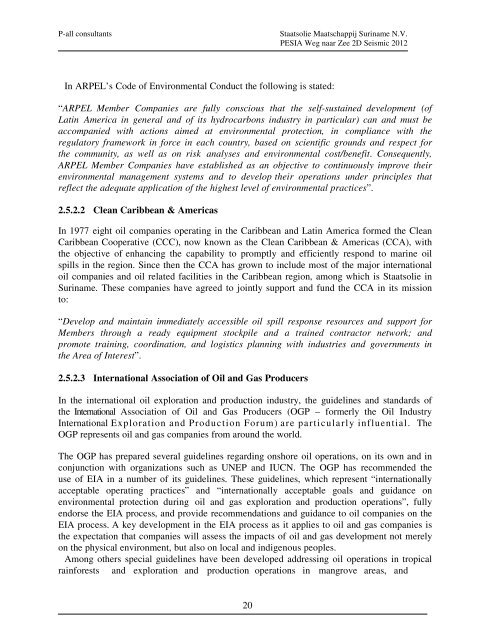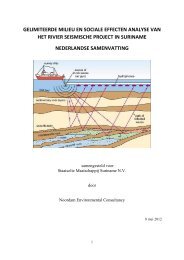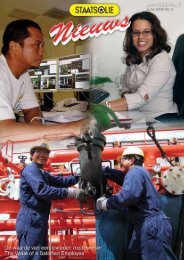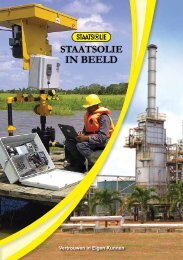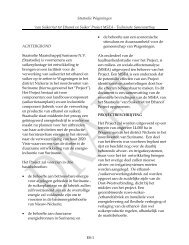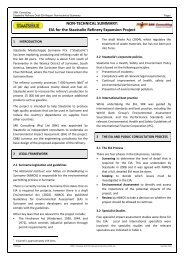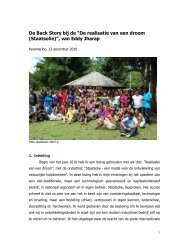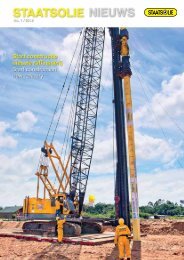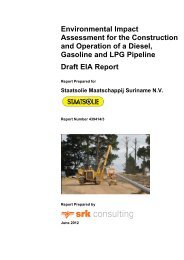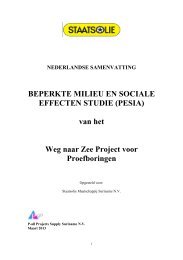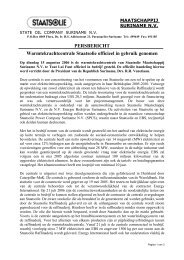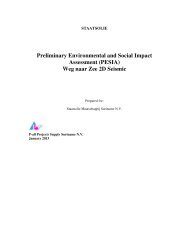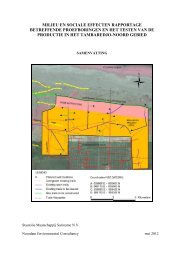(PESIA) Weg naar Zee 2D Seismic - Staatsolie
(PESIA) Weg naar Zee 2D Seismic - Staatsolie
(PESIA) Weg naar Zee 2D Seismic - Staatsolie
You also want an ePaper? Increase the reach of your titles
YUMPU automatically turns print PDFs into web optimized ePapers that Google loves.
P-all consultants <strong>Staatsolie</strong> Maatschappij Suriname N.V.<br />
<strong>PESIA</strong> <strong>Weg</strong> <strong>naar</strong> <strong>Zee</strong> <strong>2D</strong> <strong>Seismic</strong> 2012<br />
In ARPEL’s Code of Environmental Conduct the following is stated:<br />
“ARPEL Member Companies are fully conscious that the self-sustained development (of<br />
Latin America in general and of its hydrocarbons industry in particular) can and must be<br />
accompanied with actions aimed at environmental protection, in compliance with the<br />
regulatory framework in force in each country, based on scientific grounds and respect for<br />
the community, as well as on risk analyses and environmental cost/benefit. Consequently,<br />
ARPEL Member Companies have established as an objective to continuously improve their<br />
environmental management systems and to develop their operations under principles that<br />
reflect the adequate application of the highest level of environmental practices”.<br />
2.5.2.2 Clean Caribbean & Americas<br />
In 1977 eight oil companies operating in the Caribbean and Latin America formed the Clean<br />
Caribbean Cooperative (CCC), now known as the Clean Caribbean & Americas (CCA), with<br />
the objective of enhancing the capability to promptly and efficiently respond to marine oil<br />
spills in the region. Since then the CCA has grown to include most of the major international<br />
oil companies and oil related facilities in the Caribbean region, among which is <strong>Staatsolie</strong> in<br />
Suriname. These companies have agreed to jointly support and fund the CCA in its mission<br />
to:<br />
“Develop and maintain immediately accessible oil spill response resources and support for<br />
Members through a ready equipment stockpile and a trained contractor network; and<br />
promote training, coordination, and logistics planning with industries and governments in<br />
the Area of Interest”.<br />
2.5.2.3 International Association of Oil and Gas Producers<br />
In the international oil exploration and production industry, the guidelines and standards of<br />
the International Association of Oil and Gas Producers (OGP – formerly the Oil Industry<br />
International Exploration and Production Forum) are particularly influential. The<br />
OGP represents oil and gas companies from around the world.<br />
The OGP has prepared several guidelines regarding onshore oil operations, on its own and in<br />
conjunction with organizations such as UNEP and IUCN. The OGP has recommended the<br />
use of EIA in a number of its guidelines. These guidelines, which represent “internationally<br />
acceptable operating practices” and “internationally acceptable goals and guidance on<br />
environmental protection during oil and gas exploration and production operations”, fully<br />
endorse the EIA process, and provide recommendations and guidance to oil companies on the<br />
EIA process. A key development in the EIA process as it applies to oil and gas companies is<br />
the expectation that companies will assess the impacts of oil and gas development not merely<br />
on the physical environment, but also on local and indigenous peoples.<br />
Among others special guidelines have been developed addressing oil operations in tropical<br />
rainforests and exploration and production operations in mangrove areas, and<br />
20


